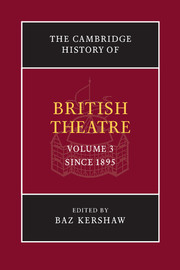Book contents
- Frontmatter
- Part I 1895–1946
- Part II Scottish and Welsh Theatres, 1895–2002
- Part III 1940–2002
- 13 British theatre, 1940–2002: an introduction
- 14 The establishment of mainstream theatre, 1946–1979
- 15 Alternative theatres, 1946–2000
- 16 Developments in the profession of theatre, 1946–2000
- 17 Case study: Theatre Workshop’s Oh What a Lovely War, 1963
- 18 1979 and after: a view
- 19 British theatre and commerce, 1979–2000
- 20 New theatre for new times: decentralisation, innovation and pluralism, 1975–2000
- 21 Theatre in Scotland in the 1990s and beyond
- 22 Theatre in Wales in the 1990s and beyond
- 23 English theatre in the 1990s and beyond
- Bibliography
- Index
- References
14 - The establishment of mainstream theatre, 1946–1979
from Part III - 1940–2002
Published online by Cambridge University Press: 28 March 2008
- Frontmatter
- Part I 1895–1946
- Part II Scottish and Welsh Theatres, 1895–2002
- Part III 1940–2002
- 13 British theatre, 1940–2002: an introduction
- 14 The establishment of mainstream theatre, 1946–1979
- 15 Alternative theatres, 1946–2000
- 16 Developments in the profession of theatre, 1946–2000
- 17 Case study: Theatre Workshop’s Oh What a Lovely War, 1963
- 18 1979 and after: a view
- 19 British theatre and commerce, 1979–2000
- 20 New theatre for new times: decentralisation, innovation and pluralism, 1975–2000
- 21 Theatre in Scotland in the 1990s and beyond
- 22 Theatre in Wales in the 1990s and beyond
- 23 English theatre in the 1990s and beyond
- Bibliography
- Index
- References
Summary
Mainstream theatre is such a major feature of the cultural landscape in Britain that it scarcely ever merits discussion as an idea, and yet it is significantly absent as an entry in the four most substantial contemporary dictionaries of the theatre. It is as if its constitution, its shape and its location were so obvious as to need no placement. Its apparent transparency as a concept is, however, highly problematic and contentious. For many contemporary analysts whose central concern is with performance rather than theatre, the simple fact that a piece takes place in a conventional theatrical space would seem to justify the descriptive tag ‘mainstream’. For others there is a perceived need to make distinctions between a ‘serious’ mainstream tradition and other occupants of the theatrical space, popular theatre and the avant-garde. The use of the qualifying ‘serious’ does not in itself greatly aid in an attempt at definition, but it does point to the way in which mainstream theatre seeks to assert itself as centrally offering a drama that is capable of sustaining debate. It is this sense of centrality that is most important in considering the development of mainstream theatre in post-World War Two Britain, for as this centre changes, so perforce must the rest of the theatrical apparatus.
- Type
- Chapter
- Information
- The Cambridge History of British Theatre , pp. 326 - 348Publisher: Cambridge University PressPrint publication year: 2004
References
- 2
- Cited by



